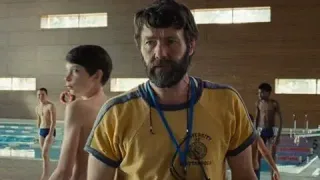October 10, 2024
While Queer Picks at the New York Film Festival Are Slim, They Are Choice
Frank J. Avella READ TIME: 9 MIN.
Elton John: Never Too Late
"I wasn't David. I wasn't Mick. I wasn't a sex symbol."
A major complaint about the entertaining and sometimes affecting new doc, "Elton John: Never Too Late," co-directed by R.J. Cutler and David Furnish (Elton's husband), is that it doesn't cover enough ground – that, and two classic Elton songs are not featured, "Goodbye Yellow Brick Road," and "Daniel." The film's main focus is on the Rocketman's career from 1970 to 1976, intercut with his farewell tour in 2022 and culminating in a heartfelt concert at Dodger Stadium – a full-circle moment, since he was the first artist to ever sell out a stadium in the 1970s (Dodger), and L.A. is where his career truly began at the famous Troubadour Club.
A little time is spent on the abusers in his life, from his parents to John Reed, his first love and manager. We also get some insight into how he was a late sexual bloomer and led a closeted life until the mid-70s, when a Rolling Stone article outed him as bisexual, which he says hurt his career.
The main issue with the doc is that Dexter Fletcher's electric biopic of Elton, "Rocketman," was far more illuminating. But there is plenty to enjoy, from some wonderful concert performances to an extended sequence involving his friendship with John Lennon, and their performance together at Madison Square Garden.
The most revealing moments are when the singer/songwriter frankly discusses his love for his family and his concerns that he might not be around to see his sons marry.
Viet and Nam
Set in the post 9/11-early 2000s, Trương Minh Quý's "Viet and Nam" is an evocative slow-burn meditation on history, memory, repression, desire, and unanswered questions.
Shot on 16mm and banned in Vietnam, the film centers on the titular characters, Viet (Dao Duy Bao Dinh) and Nam (Pham Thanh Hai), North Vietnamese coal miners who happen to be lovers and share loving moments, despite the fact that Nam is planning on leaving the country for a new life. Meanwhile, Nam's mother is searching for the final resting place of her husband, who died in the "Resistance War Against America."
"Viet and Nam" can be quite frustrating with its arty, murky, opaque style. Critics will probably go apeshit over it. Audiences, not so much. And even the gay scenes weren't so much erotic as impersonal. Still, there was something quite mesmerizing about it.
The Room Next Door
Pedro Almodóvar's queer aesthetic enhances all of his films, even those with no gay themes like "The Room Next Door."
Firstly, he's cast two gay icons as the leads in his first English-language feature.
Julianne Moore is Ingrid, a celebrated author. Tilda Swinton plays former war correspondent Martha. They're estranged friends who reunite when one finds out the other is dying of cancer. Ingrid rushes to Martha's hospital bedside, and the two instantly re-bond. But when Martha asks Ingrid to be in the room next door when Martha takes her own life, Ingrid is left with a grave decision.
Swinton is incredibly raw and authentic. Her Martha is no-nonsense, but Swinton continuously explores her nuances. It's an Oscar-worthy performance. Moore's work is rich and filled with empathy.
"The Room Next Door" is sublime cinema by a filmmaker who brilliantly explores female friendships and continues to create multi-dimensional female characters.
Maria
Angelina Jolie's tantalizing turn as the great soprano Maria Callas is the main reason to see Chilean helmer Pablo Larraín's evocative but chilly film, "Maria." Jolie will, more than likely, snag her third acting Oscar nomination.
Set in Paris in the last week of the Callas's life, the film focuses on the diva's desperate desire for a comeback. Alas, her voice is not what it once was.
The script (by "Spencer" scribe Steven Knight) never ventures far from the surface. But when Jolie is onscreen, especially when she's performing – with vocals by Callas, but interpreted by the actor – the experience is unforgettable.
And, finally, one of the best films of 2024, Sean Baker's "Anora," has the director's queer sensibility all over it, despite the fact that Baker does not identify as queer. My review of "Anora" will publish next week.






